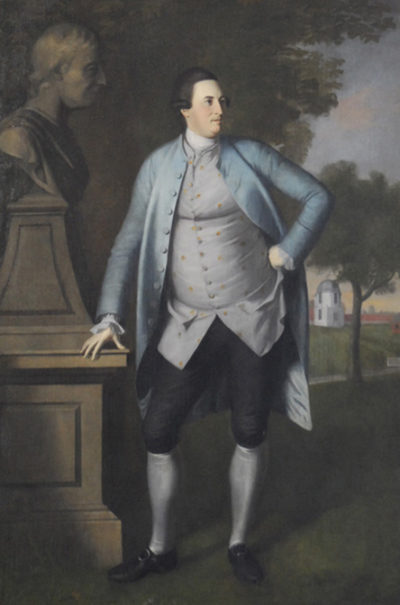William Paca (William Paca)

William Paca was born in Abingdon, in what was then Baltimore County (Abingdon was later included in Harford County when that county was formed from Baltimore County in 1773), in the British colony of Maryland. He was the child of John Paca (c. 1712 – 1785), a wealthy planter in the area, and his wife Elizabeth Smith (?-c. 1766). He was the second son of the family, after his elder brother Aquila, and had five sisters. The brothers entered school at the Philadelphia Academy and Charity School in 1752, and the younger Paca went on to attend the The College of Philadelphia (now merged into and known as the University of Pennsylvania), graduating in 1759 with a bachelor of arts degree. He was also to receive a master of arts degree from the College in 1762, though this required no further study, only that Paca request it and be in good standing. After graduating from college, Paca returned to Maryland, reading law in the colonial capital of Annapolis under the tutelage of a local lawyer named Stephen Bordley. By 1761, he was licensed to practice law, and in 1764 was admitted to the provincial bar, having stayed in Annapolis to establish his practice. Professional success was mingled with personal success, as the previous year he had courted Mary Chew, the daughter of a prominent Maryland planter, and they were married on May 26, 1763. They would go on to have three children, though only their son John Philemon survived into adulthood.
Among the other young lawyers in Annapolis at the time was Samuel Chase, who would become a close friend and political colleague of William Paca. Together, Paca and Chase led local opposition to the British Stamp Act of 1765 and established the Anne Arundel County chapter of the Sons of Liberty. William Paca was elected to the Maryland legislature in 1771 and appointed to the Continental Congress in 1774. He was reelected, serving until 1779, when he became chief justice of the state of Maryland. In 1780, he was elected to serve as a federal judge on the Court of Appeals in Cases of Capture. In 1782 he was elected governor of Maryland. On December 22, 1789, Paca received a recess appointment from President George Washington to a seat on the newly created United States District Court for the District of Maryland, created by 1 Stat. 73. Formally nominated on February 8, 1790, he was confirmed by the United States Senate on February 10, 1790, and received his commission the same day, serving as such until his death.
William Paca’s career on the Federal bench had a significant impact on the admiralty jurisdiction of the Federal courts and what was to become the principal business of the Supreme Court over the subsequent four decades. As the first Federal judge for the District Court of Maryland he rendered an opinion on the case of Betsey that would have far reaching consequences when it was overturned by the Supreme Court. In that case Paca argued on solid precedents of International and British Law that the District Court did not have jurisdiction over the awarding of prizes brought into American ports by foreign privateers. The Supreme Court asserted otherwise in seriatum opinions and established an exclusive jurisdiction over prize cases vested in the Federal District Courts that took that privilege away from what had been the responsibility of foreign consulates. Paca’s opinion was the first District Court opinion to be published and although ultimately reversed provides insight into the extensive legal training of a signer of the Declaration of Independence and an author/compiler of several provisions of what became the Bill of Rights. William Paca died in 1799 at his estate of Wye River in Queen Anne’s County, Maryland and was buried in the family cemetery there.
Born
- October, 31, 1740
- USA
- Abingdon, Maryland
Died
- October, 23, 1799
- USA
- Queenstown, Maryland
Cemetery
- Wye Plantation
- Queen Anne's County, Maryland
- USA



